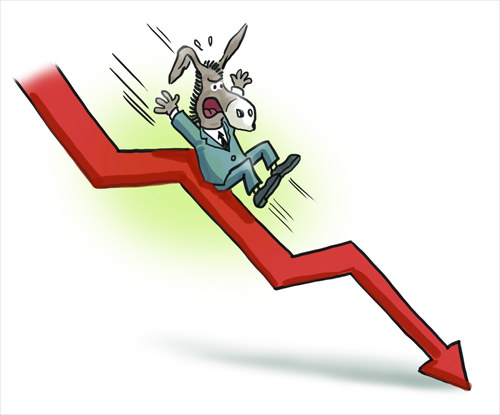HOME >> OP-ED
Stock market fall sells Democrats short in upcoming midterm elections
By Charles Gray Source:Global Times Published: 2014-10-21 18:53:01

Illustration: Liu Rui/GT
It is unlikely that the recent news regarding the dramatic fall in the world's stock markets is bringing much cheer to the White House. Indeed, as a president who was elected, at least in part, due to the perception that the Bush administration had been unable to effectively answer the economic crisis that swept the world in 2007, Barack Obama must be well aware that he now faces the same challenge.
However, at this point, it is difficult to determine the precise cause of the current fall in the world's stock markets.
The first cause can be described as the "short-term" school of thought.
According to this view, current events, such as the Ebola epidemic, Ukraine, and the continuing crisis in Syria and Iraq, have spooked investors.
In turn, this anxiety has resulted in the dramatic market losses of October. The stock market has never dealt very well with uncertainty, and none of the current crises facing the economy have a certain or easy solution.
However, this uncertainty could vanish as quickly as it appears. Unless more bad news develops, the Ebola crisis is certain to gradually fade from the thoughts of most investors.
These crises' impact on the stock market may have more to do with their continual presence in the media, rather than any serious threat to the world's economy, making their domestic economic impact a strictly short-term issue.
Some analysts expect that much of the current concern over the stock market will ease when Apple and other major companies start releasing promising quarterly earning reports in the near future, providing some badly needed good news.
The second theory is less sanguine about the stock market's long-term future.
Rather than focusing on short-term issues, this theory argues that the markets are seeing long-term weakness stemming from both current events and the continuing impact of the 2007 economic crash.
For example, Professor Steve Keen believes that underlying factors, especially the high debt levels that led to the 2007 crash, have never been truly addressed. For that reason, it was only the Federal Reserve's third round of Quantitative Easing (QE3) that allowed the stock market to ignore the still high private and public national debt levels.
Now however, economic reality is once again asserting itself in the form of the potential for a severe and long-term decline in the market.
For Obama, neither scenario is overly promising. Even a short-term stock market crash could badly harm Democratic prospects in the 2014 elections.
This could see the administration having to deal with a GOP-controlled Senate and House, which would cripple any prospects for action between now and the 2016 elections.
Obama's primary hope would be that the markets would quickly spring back before November, which would mitigate any political damage. This would also allow him to argue that his administration's economic policies were by and large successful, despite the short-term market losses.
However, a long-term decline in stocks would be nothing less than disastrous for the Obama administration. The GOP would be able to claim that Obama's economic policies had failed, and that rather than successfully solving the issue, the administration had merely postponed it by engaging in policies such as QE3.
Most importantly, for many individuals, the economy still appears to be lagging. This is especially true given the jobless nature of this recovery, with many businesses attempting to improve the productivity of their current staff rather than hiring more workers.
This scenario not only could result in a Republican senate in 2014, but also might dramatically boost the GOP's chances to claim the Oval Office.
Obama supporters might argue that the administration cannot be blamed for all of the current economic problems facing the nation. They would be right, but the US electorate has traditionally blamed the sitting government for the nation's economic difficulties.
If the stock market does not recover or its doldrums start to percolate down to a still shaky Main Street, the Democratic electoral outlook will be very grim.
On the other hand, the president may gain some comfort from the fact that a victorious GOP will be expected to fix the economy and the US people will be no more forgiving of it than they will be of the current administration.
Indeed, unless the GOP can show that it has an effective plan to improve the economy, October's stock market news may end up being as much trick as treat for the GOP.
The author is a freelance writer based in Corona, California. charlesgray109@gmail.com
Posted in: Viewpoint